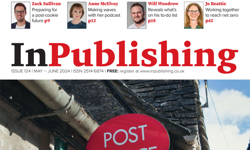
In my forward to the November / December 2019 issue of InPublishing magazine, I wrote: “It’s been a shattering year for the country as a whole, with society deeply divided, faith in our institutions severely dented, talk of insurrection and the prospect of decades of healing ahead.”
Little did I know what was just around the corner… Come back 2019, all is forgiven.
What a year it’s been. Congratulations to you for making it this far. With a vaccine seemingly imminent, we might soon be able to consign Covid to the dustbin of history. (Having said that, Professor Simon Cottle warns us on p16 that unless society starts to moderate its behaviour by showing more respect for the environment, there could be more pandemics to come.)
Under the most intense pressure, publishers have accelerated down the digital transition track at a rate that would have been unimaginable without Covid. There has, sadly, been a heavy price to pay in terms of closed titles and reduced headcount, but in terms of innovation, skilling-up and more flexible working practices, real progress has been made these past twelve months.
So, on the cusp of what will hopefully be a happier and healthier year, where does publishing stand now and what might progress look like in 2021.
For me, the answer lies in acquiring more knowledge about our customers and organising it better.
News and specialist media are increasingly putting their content behind pay / data walls and are, as a result, accumulating valuable data about who visits their sites and what they do when they’re on them. Increasingly sophisticated marketing techniques will continue to chip away at the balance of visitors who still baulk at signing up.
Mass market consumer media has traditionally been more reluctant to put up any barriers, but are nonetheless busy collecting data via subscriptions, newsletters, VIP clubs, competitions and event registrations. But, until they introduce some kind of data wall, they will be unable to personalise the user journey or make the kind of targeted offers that can lead to a step-change in marketing RoI.
During 2021, I see more data walls going up, with compelling membership-style offers to encourage sign-up, but with enough content outside the wall not to dent affiliate, licensing and other revenues.
Of course, knowledge is only as good as the organisation of it, and traditionally, this has been an area where many publishers have been found wanting with data being deposited in a series of un-connected silos making it almost impossible to construct a complete picture of the customer.
Without better data organisation, publishers can’t ascertain the true value of each customer and can’t know, in real time, what they have bought already and what they’ve yet to buy. This means we’re marketing blind. Nor can we conduct any meaningful analysis of visitor behaviour on our sites – if everyone is anonymous, site analytics is a very one-dimensional exercise.
We should all be focusing on creating a single customer view and linking the customer database to our content management system, so we know who is on our site, their purchase history and what they’re doing.
More and better organised data about our customers, tied to a focus on driving deeper engagement, alongside an ongoing investment in quality content will be what sets us apart from self-publishers, social media influencers and big tech platforms in 2021.
Knowledge is only as good as the organisation of it.
This article was first published in InPublishing magazine. If you would like to be added to the free mailing list, please register here.










